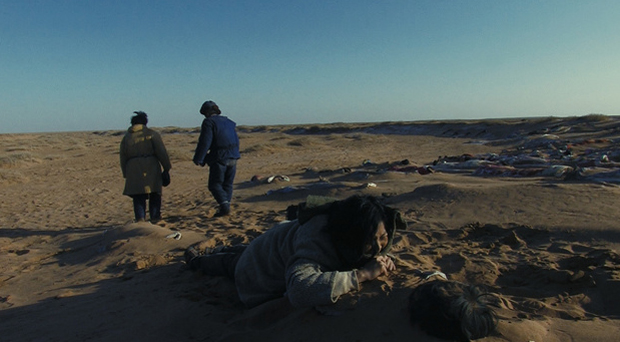Edinburgh International Film Festival 2012, Wed 20 Jun – Sun 1 Jul
It was always going to be fairly easy for the EIFF to rise above the many disappointments and pitfalls of last year’s low-key festival. Rolling out the red carpet, programming some fresh gala films, beefing up the brochure with a wider array of international screenings were all needed – thankfully decisions which have been made this time around.
There are 52 countries represented this year and the festival includes 19 World, 13 International, 11 European and 76 UK premières. Artistic Director Chris Fujiwara explains that he feels this varied and spirited mix ‘represents the state of cinema today and says something about where film might be going in the future’, as he takes the podium at the media launch.
There’s a munificent array of début Asian films including an exciting spotlight on documentarist, Wang Bing, featuring his unsettling film about Chinese labour camps, The Ditch. Clearly impressing his own prevalent interest in world cinema, Fujiwara feels this selection offers a glimpse into ‘the exceptional political surge taking place in independent documentary filmmaking in China’. It’ll be interesting to see how this translates, given the increase in Western documentaries about the economy after the financial collapse of 2007. Many of the Asian films have not been seen in the UK at all with another spotlight on Japanese cult director Shinya Tsukamoto and a full retrospective of Shinji Sōmai programmed in – filmmakers who are both masters of genre study in Asia but have yet to receive critical acclaim in the West.
There’s quite a buzz around the Philippine New Wave section too, after numerous filmmakers such as Auraeus Solito, Jeffrey Jeturian and John Torres won awards at fests including Berlin, Cannes and Venice. So far however, they’ve failed to truly break into the UK market, a concern which Fujiwara is visibly addressing in this year’s programme. A chance to see some young, independent Filipino filmmakers, a fascinating highlight looks to be Khavn De La Cruz’s somewhat ironically titled Philippine New Wave: This is Not a Film Movement, which discusses how digital technology democratised filmmaking. More importantly, this decision shows how Scotland can broaden its cinematographic techniques and how it can learn from processes found in world cinema to document its national identity. Fujiwara is deeply interested in how genre can unify national boundaries, of culture, politics and customs, and how pioneering practices can communicate these themes to an international audience.
Fujiwara, now engaging in an intimate interview with a handful of keen journos, elaborates on this and explains how ‘I’m always interested in something that’s more than just being in the genre. If it’s only doing what a thousand films have done then of course there’s no reason to have it here. The films we programme do in some sense break through genre. I think it’s something which should be embraced.’ Clearly, the experiment Fujiwara is overseeing this year is about how successfully Eastern ideals and models will resonate with a Western audience, and is commenting on the didactic function of film festivals themselves. If it weren’t for bold and intelligent programming such as this, the argument for festivals simply turning into PR events could quite easily stand tall.
Introducing documentary films into the usually feature film-exclusive International Feature Competition, Fujiwara is also pushing this global aspect of the festival hard. Asian filmmakers include Jang Kun-jae and Yeon Sang-ho both competing alongside Middle Eastern and European directors for the prize. With this year’s festival comes a truly unique opportunity to see some films never screened outside of Asia before, a chance to see inside some notoriously secretive nations and a lesson on how we value international filmmaking.
